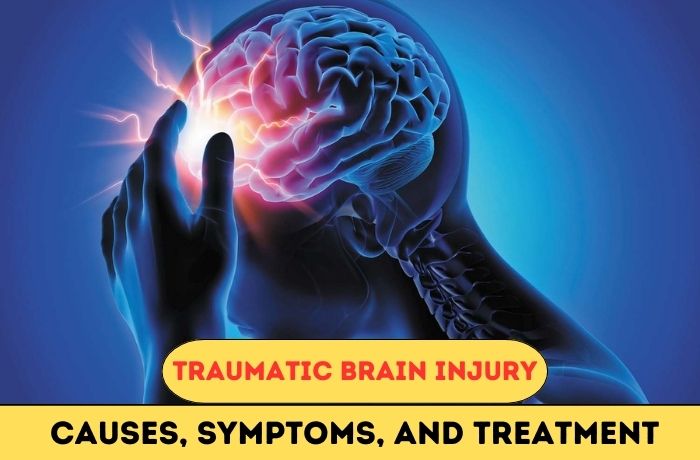We’ve all experienced those moments: falling down the stairs, a rough hit during sports, or an unexpected fall. But what happens when a head injury extends beyond a simple bump? Traumatic Brain Injury (TBI) is a serious disorder that affects millions of individuals throughout the world, so it’s important to understand the signs, symptoms, and treatment options.
Why is This Topic Important?
Whether you’ve experienced a head injury or know someone who has, TBI can have a significant impact on your life. It can affect your thinking, memory, speech, movement, and even your emotions. Early diagnosis and treatment are essential to minimize long-term complications and get you back on your feet.
What is Traumatic brain injury?
Traumatic brain injury (TBI) is a condition in which an external force affects the brain’s normal function. This force can be caused by a variety of incidents, including falls, vehicle accidents, sports injuries, violence, and explosions. TBIs range from minor concussions to severe brain injury and can have long-term consequences for a person’s physical, cognitive, and emotional health.
Symptoms of Traumatic Brain Injury:
Traumatic brain injury can have a wide range of physical and psychological symptoms. Some indications or symptoms may occur right away following the stressful experience, while others may appear days or weeks later.
Mild traumatic brain injury
The signs and symptoms of mild traumatic brain injury may include:
Physical symptoms of a traumatic brain injury may manifest in various ways, including:
- Headache: Individuals may experience persistent or severe headaches following a head injury.
- Nausea or Vomiting: Feelings of nausea or actual vomiting can occur as a result of traumatic brain injury.
- Fatigue or Drowsiness: Excessive tiredness or drowsiness, even after adequate rest, may indicate a brain injury.
- Problems with Speech: Difficulty speaking coherently or forming words can be a symptom of TBI.
- Dizziness or Loss of Balance: Sensations of dizziness or an inability to maintain balance are common physical symptoms associated with traumatic brain injury.
Sensory Symptoms:
Sensory issues may manifest in various ways following a traumatic brain injury:
- Visual Disturbances: Blurred vision or difficulty focusing on objects may occur.
- Auditory Changes: Ringing or buzzing sounds in the ears might be experienced.
- Altered Taste: Some individuals may notice a strange or unpleasant taste in their mouth.
- Changes in Smell: The ability to detect smells may be affected, with some reporting changes or loss of smell.
Traumatic brain injuries (TBIs) can occur for a variety of reasons, some of the most common of which are as follows:
- Falls: are the most common cause of TBIs, particularly in young children and elderly individuals. Falls from heights, sliding on wet flooring, or falling over objects can all result in head injuries.
- Vehicle Accidents: Car accidents, motorcycle accidents, and pedestrian accidents are all major causes of TBI. The impact of the collision might cause brain trauma.
- Sports Injuries: Impact sports such as football, soccer, and boxing might increase the likelihood of a brain injury. Collisions with other players or hard surfaces can result in TBI.
- Physical attacks, such as being hit with a blunt object or receiving a gunshot wound to the head, can lead to traumatic brain injuries.
- Workplace Accidents: Some jobs, such as construction or mining, have a higher risk of head injuries due to the nature of the task and the possibility of falling or being struck by items.
- Explosive explosions: Military personnel and civilians who are subjected to explosive explosions, such as those used in warfare or terrorist attacks, may sustain TBIs as a result of the explosion’s force.
- Shaken Baby Syndrome: When infants and young children are severely shaken, the brain hits the inside of the skull, increasing the chance of a TBI.
Must Read: Don’t Ignore These: 7 Warning Signs of a Brain Tumor
Treatment Options For Traumatic Brain Injury:
Treatment for TBI is based on the severity of the damage and can include:
- Emergency Care: Immediate medical intervention is required to stabilize the patient and avoid additional damage to the brain.
- Monitoring: Patients with mild TBI may require supervision to ensure that their symptoms do not worsen.
- Pain medications, anti-seizure medicines, and medication to minimize brain swelling may be recommended.
- Rehabilitation: Physical, occupational, and speech therapy can help people regain lost abilities and enhance their quality of life.
- Surgery: In severe TBI with bleeding or edema in the brain, surgery may be required to alleviate pressure and heal the damage.
Traumatic Brain Injury Treatment in Pune:
For individuals in Pune seeking specialized care and treatment for traumatic brain injury, Alpha Superspeciality Clinics offers complete treatment under the expertise of Dr. Ninad Patil. Dr. Patil, a renowned neurosurgeon in Pune with years of experience, provides patients with personalized care and innovative treatment options to ensure optimal recovery and rehabilitation.
Conclusion:
Traumatic brain injury is a serious condition that can have a lasting impact on one’s mental, physical, and emotional health. Understanding the causes, symptoms, and treatment decisions for TBI empowers us to notice the warning signals early, seek urgent medical attention, and help individuals afflicted by this condition on the path to recovery. If you need specialist care for a traumatic brain injury, contact Dr. Ninad Patil at Alpha Superspecialty Clinics for compassionate and thorough treatment.


